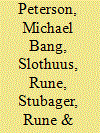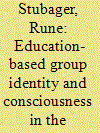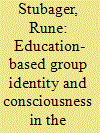| Srl | Item |
| 1 |
ID:
102562


|
|
|
|
|
| Publication |
2011.
|
| Summary/Abstract |
Public attitudes towards welfare policy are often explained by political values and perceptions of deservingness of welfare recipients. This article addresses how the impact of values and perceptions varies depending on the contextual information that citizens have available when forming welfare opinions. It is argued that whenever citizens face deservingness-relevant cues in public debate or the media, a psychological 'deservingness heuristic' is triggered prompting individuals spontaneously to think about welfare policy in terms of who deserves help. This is an automatic process, equally influential among the least and the most politically sophisticated. Moreover, when clear deservingness cues are present, the impact of values on opinions vanishes. These arguments are supported by data from two novel experimental studies embedded in separate nationwide opinion surveys. The findings revise conventional wisdom of how values and heuristics influence public opinion and have major implications for understanding dynamics in aggregate welfare opinion and attempts from political elites to manipulate public opinion.
|
|
|
|
|
|
|
|
|
|
|
|
|
|
|
|
| 2 |
ID:
086761


|
|
|
|
|
| Publication |
2009.
|
| Summary/Abstract |
The increasing importance of New Politics or authoritarian-libertarian values to electoral behaviour in advanced Western industrial democracies and the previously documented strong link between such values and educational attainment indicates that, contrary to the claims of some New Politics theorists, the ideological conflict is anchored in the social structure - in particular in educational groups. For this interpretation to be warranted, however, it should be possible to document the existence of education-based group identity and group consciousness related to the value conflict. The article develops indicators of the core variables out of Social Identity Theory. Based on a unique survey from Denmark, which includes the new set of indicators, the analyses show that members of the high and low education groups have developed both group identity and consciousness reflecting a conflict between the groups and that these factors are related to authoritarian-libertarian values. The results are interpreted as reflecting a relationship of dominance, which supports the view that the ideological conflict is structurally anchored.
|
|
|
|
|
|
|
|
|
|
|
|
|
|
|
|
| 3 |
ID:
086764


|
|
|
|
|
| Publication |
2009.
|
| Summary/Abstract |
The increasing importance of New Politics or authoritarian-libertarian values to electoral behaviour in advanced Western industrial democracies and the previously documented strong link between such values and educational attainment indicates that, contrary to the claims of some New Politics theorists, the ideological conflict is anchored in the social structure - in particular in educational groups. For this interpretation to be warranted, however, it should be possible to document the existence of education-based group identity and group consciousness related to the value conflict. The article develops indicators of the core variables out of Social Identity Theory. Based on a unique survey from Denmark, which includes the new set of indicators, the analyses show that members of the high and low education groups have developed both group identity and consciousness reflecting a conflict between the groups and that these factors are related to authoritarian-libertarian values. The results are interpreted as reflecting a relationship of dominance, which supports the view that the ideological conflict is structurally anchored.
|
|
|
|
|
|
|
|
|
|
|
|
|
|
|
|